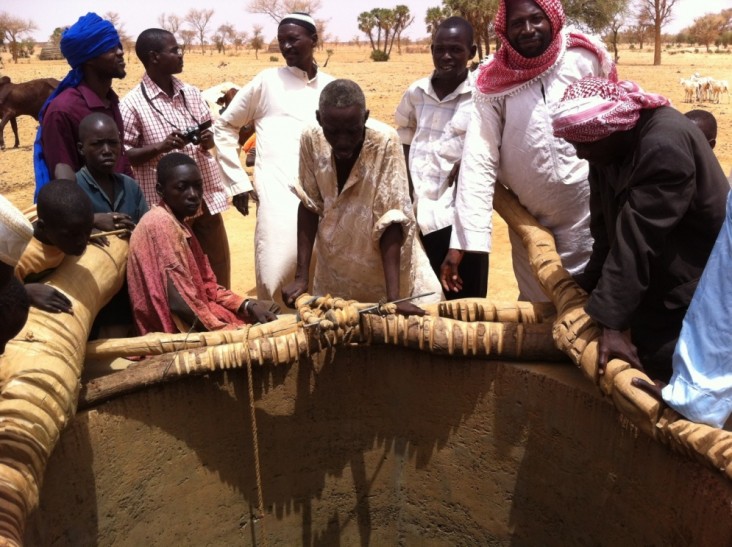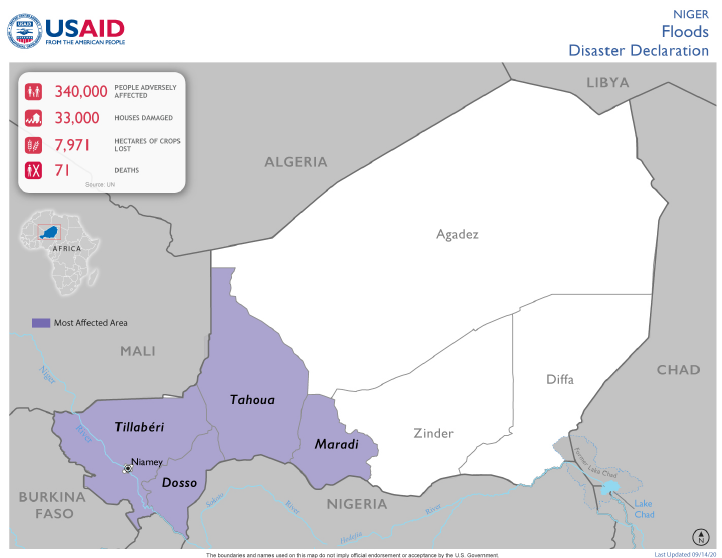- What We Do
- Agriculture and Food Security
- Democracy, Human Rights and Governance
- Economic Growth and Trade
- Education
- Environment and Global Climate Change
- Gender Equality and Women's Empowerment
- Global Health
- Humanitarian Assistance
- Transformation at USAID
- Water and Sanitation
- Working in Crises and Conflict
- U.S. Global Development Lab
Speeches Shim

Key Developments
USAID is responding to flooding, as well as two different complex emergencies in Niger. In the regions of Tillaberi and Tahoua along the Niger–Mali–Burkina Faso border, attacks by armed groups have resulted in deteriorating security and humanitarian conditions since early 2018. In addition, insecurity continues to negatively affect populations in Niger’s Diffa Region, which is part of the Lake Chad Basin. USAID's complex emergency response in the Lake Chad Basin region, also includes Nigeria, Cameroon, Chad, and Niger.
Security conditions have worsened in parts of the Lake Chad Basin in recent months as organized armed groups continue to attack civilians, particularly in northeastern Nigeria and Cameroon’s Far North Region. The ongoing conflict in the Lake Chad Basin, along with climatic shocks and extreme poverty continue to fuel a displacement crisis in the region. As of September 24, the region was hosting nearly 5.1 million internally displaced persons, refugees, recent returnees, and other migrants.
Heavy rainfall intensified beginning in late July and led to large-scale flooding across Central and West Africa—including much of the Lake Chad Basin—which has damaged cropland, houses, transportation systems, and other infrastructure and led to displacement in affected areas.
Community transmission of COVID-19 is ongoing across the Lake Chad Basin, and travel restrictions and other measures meant to prevent the spread of COVID-19 continue to negatively affect humanitarian conditions. Although humanitarian actors are providing food assistance in accessible areas of the Lake Chad Basin, the ongoing conflict continues to generate widespread food insecurity, which has been exacerbated in recent months by large-scale flooding and the COVID-19 pandemic.
Please visit our web page for additional information.
Background
In Fiscal Year 2019, the USG provided more than $60.5 million to support the humanitarian response in Niger. The figure includes approximately $31.5 million from USAID, and approximately $29 million from the U.S. Department of State's Bureau of Population, Refugees, and Migration. The response in Niger is part of a larger response across the Lake Chad Basin, for which the USG has provided approximately $469 million in FY 2019 humanitarian funding.
On December 13, 2019, U.S. Ambassador Eric P. Whitaker redeclared a disaster in Niger due to the ongoing complex emergency in the Lake Chad Basin and redeclared an additional disaster in Niger due to emergency conditions caused by conflict-related displacement in Tahoua and Tillaberi.


Comment
Make a general inquiry or suggest an improvement.